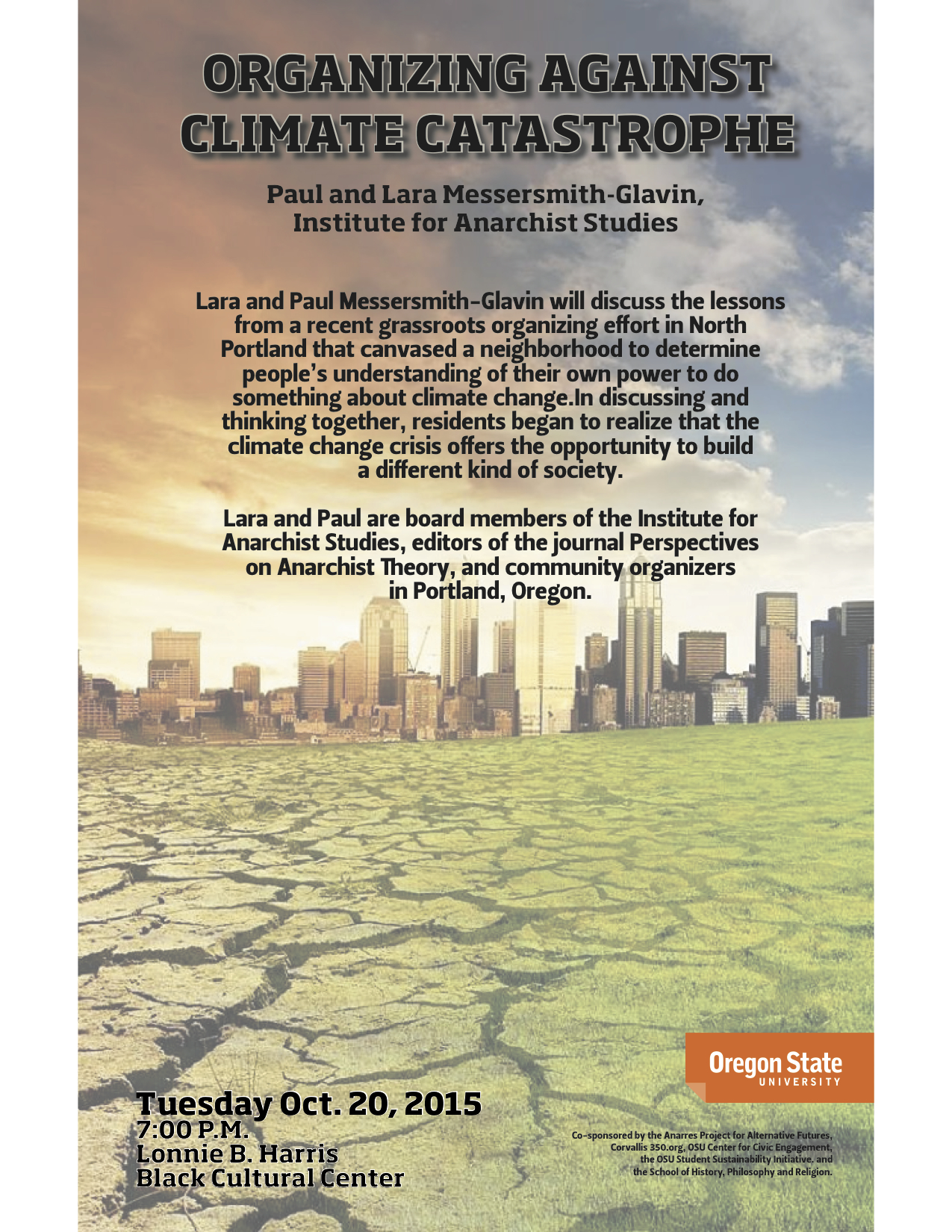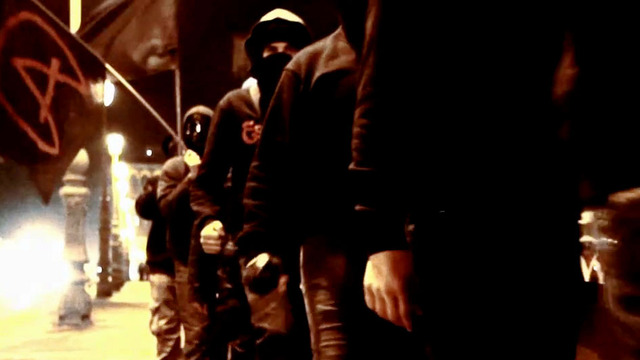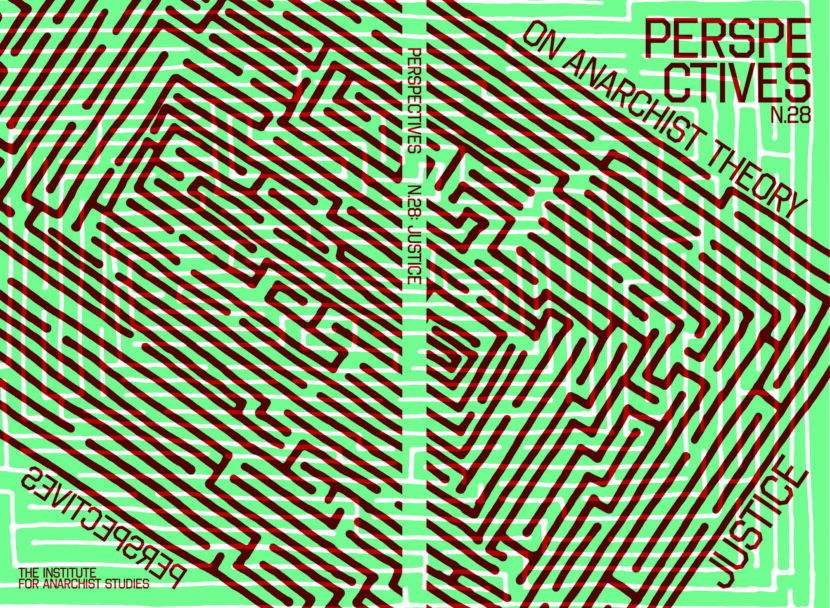(This essay appears in the new issue of Perspectives on Anarchist Theory, available from AK Press here.)
I come from a family of short, strong, resilient women. My maternal grandmother, Antonina, ground corn in a molino, or mill. She lived on the southern side of town, the poor side of town, and her clients came to her mill not only to grind their corn, but to share with her their happiness, laughter, sorrows, and tears. In this impoverished community—where women would wake up at 3:00am to cook their corn, stand in line by 4:00am to see those same kernels ground into powder, and then take this masa home again to turn it into dough, into tortillas, into the basic caloric morning meal—this was the only place outside their homes where they could share topics they were too ashamed or scared to talk about elsewhere. Most of these talks were about love, betrayal, violence, and rage.

Organizing Against Climate Catastrophe

Lara and Paul Messersmith-Glavin, of the IAS and Perspectives on Anarchist Theory collectives, will reflect on the lessons of an organizing campaign done in the St. Johns neighborhood of Portland, Oregon. St. Johns is a conduit of fossil fuel exports in the Pacific Northwest, and was the site of the blockade of the Shell contracted ice-breaker Fennica – trying to reach the Arctic to assist in drilling for oil – involving people suspended from the bridge, people in kayaks on the water, and people on the land.
Support Radical Writing!
The current issue of Perspectives on Anarchist Theory, N. 28 on Justice, available here, features two essays written by people financially supported by a grant from the Institute for Anarchist Studies. The money for these grants come from donations from people like yourself, and allow these, and many other folks, to complete their writing projects. It allows them to do things like take time off work, or hire childcare, so they can write.
Layne Mullett, who wrote “Brick by Brick: Creating a World Without Prisons,” in the current issue, had this to say, “Getting a grant from the Institute for Anarchist studies allowed me to carve out time to think through and put down on paper some of the lessons I’ve learned from years of doing anti-prison organizing. The patient, thoughtful engagement and assistance from my (IAS) grant adviser pushed me to move forward with a project I otherwise would have given up on and helped deepen my political thinking about the daily work of building a movement to end mass incarceration.”
2015 IAS Writing Grants
The IAS received over 35 applications for writing grants in 2015, many of them outstanding. We awarded money to support the writing of two. The grants awarded are for projects by Laura Hall and E Ornelas.
Interviews from an Uprising, by Sarah Coffey
This essay appears in the current print edition of Perspectives on Anarchist Theory, N. 28 on Justice, available from AK Press here.
In the United States, the cops and the courts are essentially the same thing. Witness Ferguson, Missouri, 2014, a typical but nonetheless shocking systemic failure of justice—starting with the execution of an unarmed 18 year old Black man by a police officer, escalating into a secret trial manufactured to protect the killer by a cop-loving prosecutor1, culminating in a military exercise in the modern police state with more felony prosecutions than any protest scenario in the last 20 years2. (by Jacob Crawford)
(by Jacob Crawford)
In the Ferguson/St. Louis3 area and across the country, people are pushing back against the systems of injustice and white supremacy that maintain societal control in the hands of the powerful few. Because the issues underlying the tragedy of August 9th go to the heart of systemic oppression in the US, the popular response has broad implications for the political future of the country.
Confronting Vigilante Responses in Accountability Work: The Need for Accountability in Everything We Do
by Romina Akemi
This piece originally appeared in Perspectives on Anarchist Theory‘s Justice issue (n.28) in 2015. On June 7th, 2014 multiple organizations in the Los Angeles-area hosted an event called “Transformative Justice: Our Movements and Our Struggle” at the Asian Americans Advancing Justice space in downtown Los … Read more
Towards a Fatter Insurrection: Introduction to a Revolutionary Body Liberation Movement, by Shane Burley
After Jessica parked, she was too busy juggling her phone and keys to notice the crowd of teenage boys moving toward her vehicle. As she got out she immediately recognized what was happening. It wasn’t the first time. She began walking to the café as … Read more
Against Deep Green Resistance, by Michelle Renée Matisons and Alexander Reid Ross
For a book that advertises itself as a “shift in strategy and tactics,” Deep Green Resistance (DGR) has an overwhelmingly dispiriting tone, and is riddled with contradictions.[1] While DGR provocatively addresses many pressing social and ecological issues, its opportunistic, loose-cannon theoretical approach and highly controversial … Read more
Towards an Anarchism with Principles: A Response to “Freely Disassociating,” by Scott Campbell

I read with interest Kevin Van Meter’s recent essay, Freely Disassociating: Three Stories on Contemporary Radical Movements published by Perspectives on Anarchist Theory on the Institute for Anarchist Studies website. In it, he discusses the current climate within the anarchist movement, painting a grim picture where increasingly meaningless labels and judgments get tossed about like political hand grenades, shutting down discussion, utilizing guilt-by-association, fomenting an atmosphere of anti-intellectualism and devolving into moralizing-outrage-as-activism. In his third of the three anecdotes he shares, he also elaborates how association with the anarchist movement can lead to unreasonable expectations and standards being placed on an individual. As a result, the radical movement has largely become a void consumed by the loudest voices or the latest controversy, leading people to disassociate from it.
Facing this scenario, Van Meter argues for developing an “anarchism with principles” based in a milieu of “working class, and revolutionary, intellectual culture.” The principles would emerge through dialog, debate, organizing and application in struggle.
Fugitive Flesh: Gender Self-Determination, Queer Abolition, and Trans Resistance, by Eric A. Stanley
We always felt that the police were the real enemy. —Sylvia Rivera
Bright lights shattered the dark anonymity of the dance floor. The flicker warned of the danger of the coming raid. Well experienced, people stopped dancing, changed clothing, removed or applied makeup, and got ready. The police entered, began examining everyone’s IDs, and lined up the trans/gender-non-conforming folks to be “checked” by an officer in the restroom to ensure that they were wearing the legally mandated three pieces of “gender appropriate clothing.” Simultaneously the cops started roughing up people, dragging them out front to the awaiting paddy wag- on. In other words, it was a regular June night out on the town for trans and queer folks in 1969 New York City.
As the legend goes, that night the cops did not receive their payoff or they wanted to remind the patrons of their precarious existence. In the shadows of New York nightlife, the Stonewall Inn, like most other “gay bars,” was owned and run by the mafia, which tended to have the connections within local government and the vice squad to know who to bribe in order to keep the bar raids at a minimum and the cash flowing. As the first few captured queers were forced into the paddy wagon, people hanging around outside the bar began throwing pocket change at the arresting officers; then the bottles started flying and then the bricks. With the majority of the patrons now outside the bar, a crowd of angry trans/queer folks had gathered and forced the police to retreat back into the Stonewall. As their collective fury grew, a few people uprooted a parking meter and used it as a battering ram in hopes of knocking down the bar’s door and escalating the physical confrontation with the cops. A tactical team was called to rescue the vice squad now barricaded inside the Stonewall. They eventually arrived, and the street battle raged for two more nights. In a blast of radical collectivity, trans/gender-non-conforming folks, queers of color, butches, drag queens, hair-fairies, homeless street youth, sex workers, and others took up arms and fought back against the generations of oppression that they were forced to survive.1




